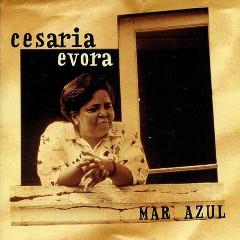Cesaria Evora – Mar Azul (1991)
Cesaria Evora – Mar Azul (1991)

1 Mar Azul 3:35 2 Cize 5:19 3 Estanhadiha 2:41 4 Cabo Verde 3:12 5 Belga 4:54 6 Cretcheu Di Ceu 6:12 7 Cinturão Tem Mel (Dansa Tcha Tcha Tcha) 3:31 8 Separação 4:49 Cavaquinho – Bao Clarinet – Luis Morais Drums – Tey Guitar – Vozinha Piano – Humberto, Toy Vieira Trumpet – Morgadinho
From Cesaria Evora's opening wail on Mar Azul's title track, one knows that this disc, a short set comprised of only eight songs, is going to be something special. This is the album that won Evora the praise of Paris, and was released prior to her international hit, Miss Perfumado. These are classic mornas at their most haunting -- all the songs are devastating, slow-burning, and stellar. The subject matter is about love, loss, and the heartbreak of life in Cape Verde. The music is acoustic, with guitars, sweeping pianos, and the occasional horn or violin to augment the effect. The liner notes set up the image of Evora ("Cize," as she is known to those close to her) as she prepares to sing in a smoky Cape Verdean nightclub. The overlying feel of this album is that of a dark and intimate seaside bar, under a starry sky, featuring a beloved singer who woos the audience with her dreamy, mesmerizing voice. Highlights include the haunting "Mar Azul," the elegantly moody "Cabo Verde," the album's two upbeat tracks, "Estanhadinha" and "Cinturao Tem Mele," and its heartbreaking finale, "Separacao." This truly original and understated album burns with the underlying ferocity of an emotional roller coaster, and introduced to the world the mornas of Cape Verde and their most famous interpreter, Cesaria Evora. ---Jose F. Promis, AllMusic Review
Pochodzi z Republiki Zielonego Przylądka. Nazywana „Bosonogą Divą”, gdyż podczas koncertów – śpiewa bez jakiegokolwiek obuwia. Prawdopodobnie najbardziej znana na świecie wykonawczyni stylu „morna”, tradycyjnej muzyki swej ojczyzny.
Urodziła się 27 sierpnia 1941 roku w Mindelo. Mając szesnaście lat występowała już w lokalnych barach, a także nagrywała pierwsze piosenki dla radia. W 1975 roku, zrażona brakiem sukcesów, zaprzestała działalności muzycznej.
Przełomem w jej karierze okazało się spotkanie producenta José da Silvy, wywodzącego się z Capo Verde. W efekcie obydwoje nawiązali długotrwałą i owocną współpracę. W 1988 roku wydała we Francji swoją pierwszą, dojrzałą płytę, „La Diva aux pieds nus” (1988), a dwa lata później ukazał się longplay „Distino di Belita”.
W 1991 roku pojawił się całkowicie akustyczny album „Mar Azul” i to właśnie za jego sprawą, przylgnęło do artystki miano „Bosonogiej Divy”. ---rmf.fm
download (mp3 @VBR kbs):
yandex mediafire ulozto gett bayfiles








